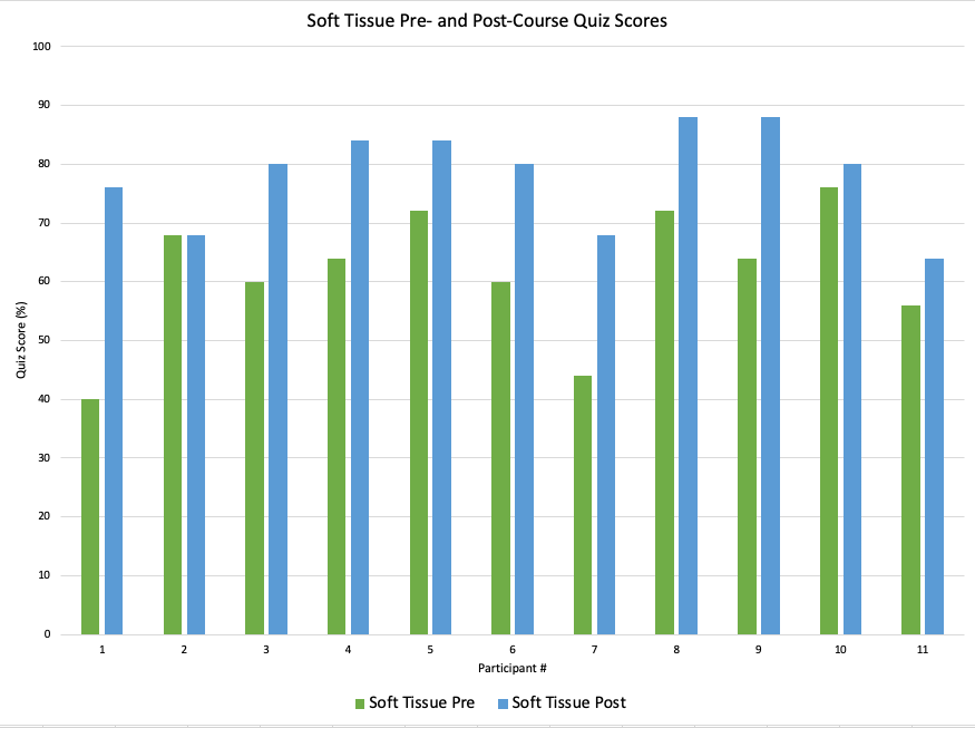Medical Education: Resident
Category: Abstract Submission
Medical Education 10 - Medical Education: Resident III
260 - Pediatric Point-of-Care Ultrasound Curriculum Combining an Online Question Bank with Established Learning Modalities
Sunday, April 24, 2022
3:30 PM - 6:00 PM US MT
Poster Number: 260
Publication Number: 260.330
Publication Number: 260.330
Celia Sobelman, Pediatrics, Worcester, MA, United States; Carolina Vega, University of Massachusetts Chan Medical School, Worcester, MA, United States; Zachary W. Binder, UMass Memorial Children's Medical Center, Sudbury, MA, United States

Celia Sobelman, MD
Resident Physician
Pediatrics
University of Massachusetts Medical School
Worcester, Massachusetts, United States
Presenting Author(s)
Background: Point-of-Care Ultrasound (POCUS) is well established as a standard of care in Emergency Medicine. The importance of POCUS is being increasingly recognized by other fields of medicine and as such POCUS is starting to be taught in many medical schools. In recent years, pediatric residency programs have started to appreciate the utility of POCUS and many institutions have started to incorporate it into the curriculum. POCUS is a skill that is useful for many pediatric subspecialties such as Critical Care, Neonatology, and Hospital Medicine. Whether residents ultimately end up in one of these fields, they are likely to interact with colleagues in these fields making an understanding of the benefits and limitations of POCUS extremely useful. POCUS is typically taught through a combination of didactic lectures and hands-on instruction. There is not an established, online POCUS learning platform.
Objective: The aim of this project is to evaluate the efficacy of a novel POCUS curriculum that incorporates an online question bank (QB), with tutorial explanations, in addition to a traditional didactic and hands-on learning experience.
Design/Methods: IRB approval was obtained; learners were a cohort of Pediatric Interns from a single institution. They consented to participate in this study. Four POCUS topics were chosen for study: Focused Assessment by Sonography for Trauma (FAST), Soft Tissue, Lung, and Cardiac. Prior to each session, learners were asked to complete a topic-specific quiz comprised of 25 randomly selected questions from the QB. A brief tutorial was available for learners to review after each QB question. Participants then attended an in-person session comprised of a didactic lecture and a corresponding hands-on skill session. After each session, learners were given a unique set of 25 topic-specific questions in order to evaluate knowledge acquisition. Analysis was done using Paired Student’s t-tests.
Results: Learners showed statistically significant improvement in ultrasound knowledge base after the FAST session (p-value of < 0.01), and Soft Tissue session (p-value of < 0.01). Figures 1 and 2 show quiz scores for FAST and Soft Tissue, respectively.Conclusion(s): A novel POCUS curriculum utilizing the combination of an online question bank and hands-on teaching demonstrates promise for future pediatric learners. Future direction includes stratification by session attendance to further differentiate the effects of the online QB from the didactic and hands-on sessions.
CSS_CV_2022_PDF.pdf
Soft Tissue Pre- and Post-Course Quiz Scores This graph shows the pre and post-course scores listed by the participant ID from the Soft Tissue ultrasound session.
This graph shows the pre and post-course scores listed by the participant ID from the Soft Tissue ultrasound session.
Objective: The aim of this project is to evaluate the efficacy of a novel POCUS curriculum that incorporates an online question bank (QB), with tutorial explanations, in addition to a traditional didactic and hands-on learning experience.
Design/Methods: IRB approval was obtained; learners were a cohort of Pediatric Interns from a single institution. They consented to participate in this study. Four POCUS topics were chosen for study: Focused Assessment by Sonography for Trauma (FAST), Soft Tissue, Lung, and Cardiac. Prior to each session, learners were asked to complete a topic-specific quiz comprised of 25 randomly selected questions from the QB. A brief tutorial was available for learners to review after each QB question. Participants then attended an in-person session comprised of a didactic lecture and a corresponding hands-on skill session. After each session, learners were given a unique set of 25 topic-specific questions in order to evaluate knowledge acquisition. Analysis was done using Paired Student’s t-tests.
Results: Learners showed statistically significant improvement in ultrasound knowledge base after the FAST session (p-value of < 0.01), and Soft Tissue session (p-value of < 0.01). Figures 1 and 2 show quiz scores for FAST and Soft Tissue, respectively.Conclusion(s): A novel POCUS curriculum utilizing the combination of an online question bank and hands-on teaching demonstrates promise for future pediatric learners. Future direction includes stratification by session attendance to further differentiate the effects of the online QB from the didactic and hands-on sessions.
CSS_CV_2022_PDF.pdf
Soft Tissue Pre- and Post-Course Quiz Scores
 This graph shows the pre and post-course scores listed by the participant ID from the Soft Tissue ultrasound session.
This graph shows the pre and post-course scores listed by the participant ID from the Soft Tissue ultrasound session.